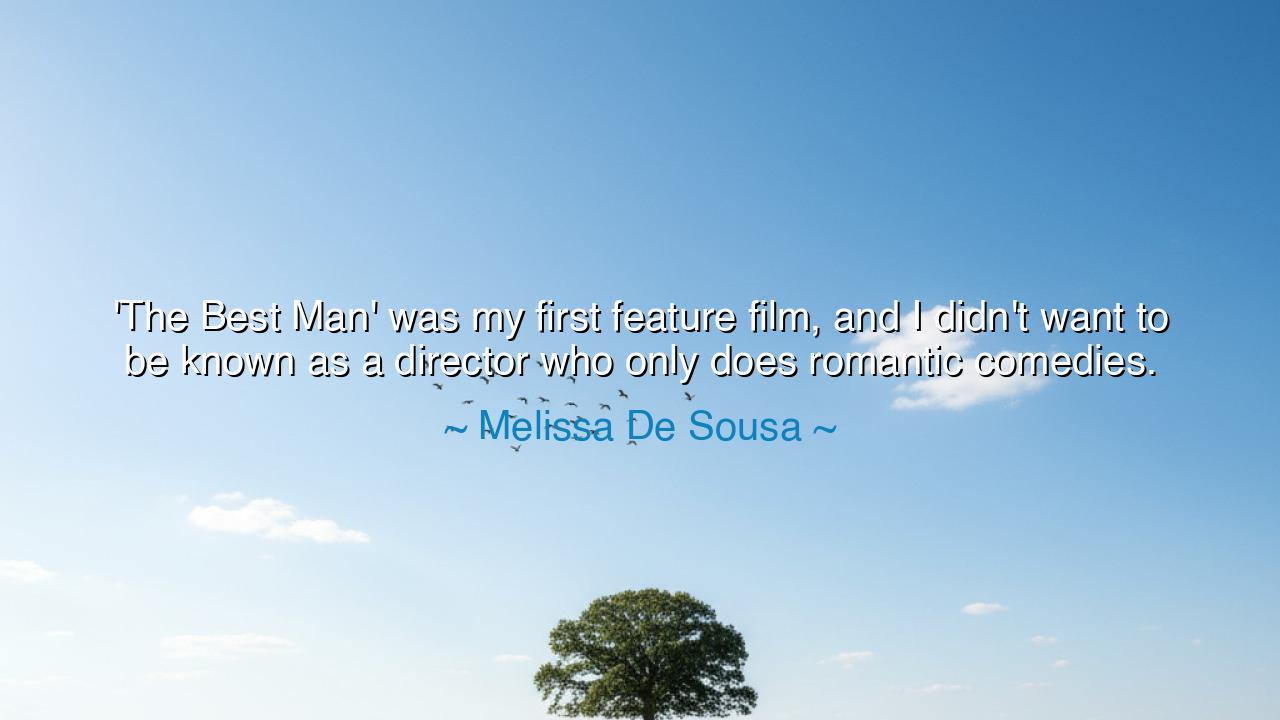
'The Best Man' was my first feature film, and I didn't want to be
'The Best Man' was my first feature film, and I didn't want to be known as a director who only does romantic comedies.






Hear now the words of Melissa De Sousa, who once declared with honesty and resolve: “‘The Best Man’ was my first feature film, and I didn’t want to be known as a director who only does romantic comedies.” Though spoken in the language of cinema, these words resound far beyond the world of film. They are the cry of every soul who longs not to be confined, not to be chained by the narrow vision of others. In her statement, we hear the ancient yearning for freedom—the freedom to create, to grow, to become more than one single role.
The film “The Best Man” marked a beginning, yet beginnings carry both triumph and peril. For when the world sees you first in one shape, it hastens to declare that this is your destiny forever. The painter who succeeds in portraiture is told never to attempt landscapes. The warrior who wins one battle is told his fate is only war. And the director who births a romantic comedy is told by the voices of industry that this is her path and none other. But the spirit within cries out: I am more. I am larger than your categories. I am not a single mask, but a living, ever-shifting soul.
Consider the story of Leonardo da Vinci, whose patrons often pressed him to paint alone. Yet his restless genius reached beyond the canvas—into anatomy, mechanics, music, and philosophy. Had he listened to the narrow expectations of others, we would not know him as the many-sided titan he became. So too, Melissa De Sousa, in naming her resistance, joins the eternal fellowship of creators who refuse confinement. She reminds us that to be labeled is to be diminished, unless we break the chains of such names.
The world has always hungered for simplicity, for categories that are neat and small. But human beings are not small. To live as if you were only one thing is to betray the immensity of the soul. Romantic comedies may bring joy, laughter, and tenderness, but what of tragedy, what of epic, what of stories that pierce the heart with questions of justice, mortality, and destiny? The artist must be free to walk among them all, to taste the full banquet of human expression.
Yet this teaching is not only for artists. Every man and woman is pressed into categories by the world: the diligent worker, the parent, the scholar, the laborer, the quiet one, the dreamer. Too often we accept these labels until they harden into prisons. But the wise refuse. They know that within one soul may live a poet and a warrior, a healer and a wanderer, a leader and a servant. To accept one title as the whole truth is to silence all the other voices within you.
So what is the lesson? Do not let the world decide for you what you are. Rejoice in beginnings, but do not be bound by them. Guard against the chains of reputation, for they can become as heavy as iron. Seek always to expand, to test, to surprise even yourself with the newness of what you can create. Let your first work be a seed, but not a cage. For the soul, like the artist, must keep growing lest it wither.
Therefore, children of tomorrow, when you are praised for one thing, thank them—and then go forth and attempt another. When they try to name you, accept no name that limits you. When they tell you that your place is here, rise and walk further still. In this way, you will live as Melissa De Sousa teaches—not as one who is defined by a single role, but as one who embraces the fullness of the human spirit.
Thus her words, born from the world of cinema, become timeless counsel: never let the first chapter of your story be mistaken for the whole book. For you are vast, and the world has yet to see all that you may become.






AAdministratorAdministrator
Welcome, honored guests. Please leave a comment, we will respond soon